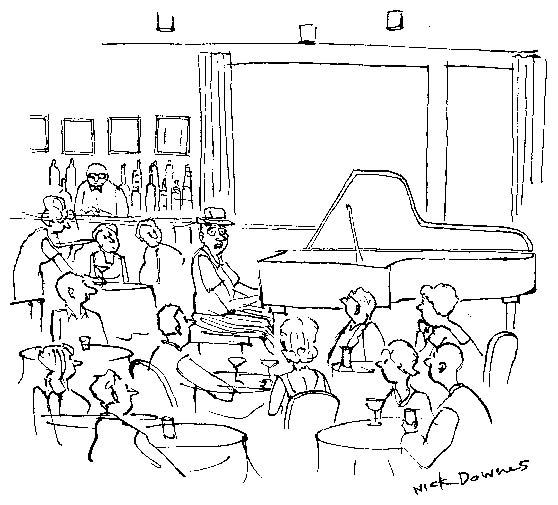Horizon (BBC2, Monday) asked, ‘What is reality?’ and didn’t really have an answer.
Horizon (BBC2, Monday) asked, ‘What is reality?’ and didn’t really have an answer. Well, it seems nobody does, though plenty of physicists, mathematicians and astronomers are working on it. As the voiceover told us, ‘Once you have entered their reality, your reality may never look the same.’ You can say that again. It appears that quantum particles can literally be in two places at the same time. But we are made up of quantum particles, and we are never in two places at the same time, even if that would occasionally be useful. So maybe there are more of us, all made up of the same particles but doing different things in different places. Possibly infinite numbers of us.
It was brave of the BBC. Particle physics, unlike cookery and wildlife, is not a natural for television. For a start, apart from chaps in beards, there isn’t much to look at, so we had lots of squiggles on blackboards, plus persons walking slowly and significantly across the Millennium Bridge.
Also, there were challenging lines, such as, ‘Is reality granular, and would that translate into ripples in the fabric of space-time?’ I’d like to see Cheryl Cole wrap her chops round that.
Even the anecdotes taxed the brain. Apparently, Einstein asked Niels Bohr, ‘Can you say that the moon is not there if nobody is looking at it?’ Bohr replied, ‘Can you prove the opposite?’ (I was reminded of the old philosophical conundrum: ‘How can you be sure that the train is leaving Paddington station and not that Paddington is leaving the train?’ Answer: you know when you reach Slough.) Apparently, Bohr might be right. Quarks behave differently when they are observed, like petty criminals on CCTV.
Another drawback is that even quantum physicists don’t understand quantum physics. But at least they understand what they don’t understand, which is more than the rest of us. They’ve been looking for the Higgs boson particle for 50 years now, and they still haven’t found the little bugger. And their latest surmise is that everything may be a gigantic hologram projected from our event horizon — the edge of the known universe (which might be only one of an infinity of universes). Fascinating. Bewildering. Brilliantly projected. Now, I wonder what Jamie is cooking tonight?
But the question of what is really reality also lies behind Episodes (BBC2, Monday), which has reached its second, er, episode. The sitcom’s conceit is that a British couple has written a Bafta-winning sitcom (once again, television is devouring itself) about a private school run by loveable Richard Griffiths. An American network chief adores it, but he hasn’t actually watched it, and he doesn’t want Richard Griffiths in it, so he proposes Matt LeBlanc (‘Joey’ from Friends). The show is now about a loveable hockey coach, renamed Pucks. The couple, Tamsin Greig and Stephen Mangan, quickly realise they are living in an alternative reality — almost everything people tell them in Los Angeles is a lie, and alarmingly some of the lies turn out to be true. As Beverly, the wife, Tamsin Greig insists on saying what she really thinks, and this is intolerable for everyone she meets, most of all her husband, who has bought the whole package and like a quark can be mentally in two places at once.
This has turned into a very funny show, but also very painful, and I watched the last ten minutes through my fingers.
I’ll bet none of the people who appears in An Island Parish (BBC2, Friday), the documentary currently set on the isle of Barra, has ever told a lie. This is the most beguiling show this year. It is so gentle that it makes The Archers look like The Oresteia. The scenery is stunning, the people are delightful (the parish priest is invited to teenagers’ parties), and the biggest cliffhanger is whether Fr Roddy’s chickens will beat Flora Campbell’s at the agricultural show. Nothing in reality television is ever remotely real, so I only believe this Elysium up to a point, but it isn’t half happy and warming and cuddly.
Television was munching on itself again with Hattie (BBC4, Wednesday), which was about Hattie Jacques, who was incredibly popular in the Fifties and Sixties. She was married to John Le Mesurier, but took a young lover, and moved him into the marital bed. But he later left her and she died unhappy. We saw almost nothing of her work. The show, which featured a short part of her life, was brilliantly acted by Ruth Jones as Hattie and Robert Bathurst as the complaisant Le Mesurier — you could imagine him giving his wife to Captain Mainwaring — but in the end I felt like a voyeur. Like the sex life of Albert Einstein, it wasn’t really the point.





Comments